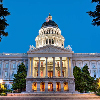Changes in Student and Curriculum Laws: Religious Fasting Accommodations in PE, and Menstrual Health Curriculum in Sexual Health Education

October 2024
Number 46
Among the many recent bills passed by the California Legislature and signed into law are two bills impacting students and curriculum: Assembly Bill (AB) 2377 and AB 2229. Both bills go into effect January 1, 2025.
AB 2377 – Religious Fasting Accommodation
AB 2377 adds section 51240.5 to the Education Code and requires any student from kindergarten through 12th grade who is participating in religious fasting to be granted an accommodation during any physical activity portions of a physical education (PE) class. To qualify for the accommodation, the parent or guardian of the student must submit to the school principal a written notification that the student is participating in religious fasting. If a student is 18 years of age, they may submit a written notification on their own accord.
The legislation recognizes that students observing religious fasting may find themselves struggling to meet a PE requirement. Since students must meet currently mandated instructional time for PE, students who receive the religious accommodation must be credited for instructional PE time upon completion of alternative assignments or activities.
AB 2229 – Menstrual Health Curriculum
AB 2229 supplements the existing California Healthy Youth Act by amending Education Code section 51931, which ensures that middle and high schoolers receive comprehensive sexual health education. The current curriculum requirements do not explicitly address menstrual health. AB 2229 recognizes the importance of and seeks to incorporate age-appropriate instruction and materials that teach students about the menstrual cycle, premenstrual syndrome and pain management, menstrual hygiene management, menstrual disorders, menstrual irregularities, menopause, menstrual stigma, and any other relevant topics related to the menstrual cycle.
Takeaways
These changes in the law will require updated policies and procedures. For AB 2377, schools will need to require and track religious fasting notifications and be prepared to offer alternative activities for accommodated fasting students. For AB 2229, schools will need to incorporate menstrual health instruction into their existing comprehensive sexual health education.
If you have any questions about these new laws, or to discuss student issues, instructional requirements, or curriculum requirements, please contact the authors of this Client News Brief or any attorney at one of our eight offices located statewide. You can also subscribe to our podcasts, follow us on Facebook, Twitter and LinkedIn or download our mobile app.
Number 46
Among the many recent bills passed by the California Legislature and signed into law are two bills impacting students and curriculum: Assembly Bill (AB) 2377 and AB 2229. Both bills go into effect January 1, 2025.
AB 2377 – Religious Fasting Accommodation
AB 2377 adds section 51240.5 to the Education Code and requires any student from kindergarten through 12th grade who is participating in religious fasting to be granted an accommodation during any physical activity portions of a physical education (PE) class. To qualify for the accommodation, the parent or guardian of the student must submit to the school principal a written notification that the student is participating in religious fasting. If a student is 18 years of age, they may submit a written notification on their own accord.
The legislation recognizes that students observing religious fasting may find themselves struggling to meet a PE requirement. Since students must meet currently mandated instructional time for PE, students who receive the religious accommodation must be credited for instructional PE time upon completion of alternative assignments or activities.
AB 2229 – Menstrual Health Curriculum
AB 2229 supplements the existing California Healthy Youth Act by amending Education Code section 51931, which ensures that middle and high schoolers receive comprehensive sexual health education. The current curriculum requirements do not explicitly address menstrual health. AB 2229 recognizes the importance of and seeks to incorporate age-appropriate instruction and materials that teach students about the menstrual cycle, premenstrual syndrome and pain management, menstrual hygiene management, menstrual disorders, menstrual irregularities, menopause, menstrual stigma, and any other relevant topics related to the menstrual cycle.
Takeaways
These changes in the law will require updated policies and procedures. For AB 2377, schools will need to require and track religious fasting notifications and be prepared to offer alternative activities for accommodated fasting students. For AB 2229, schools will need to incorporate menstrual health instruction into their existing comprehensive sexual health education.
If you have any questions about these new laws, or to discuss student issues, instructional requirements, or curriculum requirements, please contact the authors of this Client News Brief or any attorney at one of our eight offices located statewide. You can also subscribe to our podcasts, follow us on Facebook, Twitter and LinkedIn or download our mobile app.
As the information contained herein is necessarily general, its application to a particular set of facts and circumstances may vary. For this reason, this News Brief does not constitute legal advice. We recommend that you consult with your counsel prior to acting on the information contained herein.





